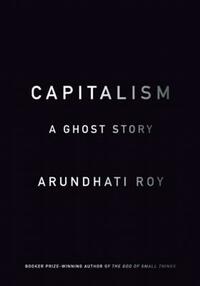Take a photo of a barcode or cover
challenging
dark
informative
sad
fast-paced
Vocab
Germane: relevant to a subject under consideration (that is not germane to our theme.)
“[due to capitalism and concentrated wealth], tidal waves of money crash through the institutions of democracy - the courts, the parliament - as well as the media, seriously compromising their ability to function in the ways they are meant to. The noisier the carnival around elections, the less sure we are that democracy really exists.” (11)
On response to 2006 Salwa Judum activity in Chhattisgarh
“After three years of ‘low-intensity conflict’ that has not managed to ‘flush’ rebels out of the forest, the central government has declared it will deploy the Indian army and air force. In India we don’t call this war. We call it ‘Creating a Good Investment Climate.’ ‘“ (13)
Company owned (or even lobbied measures) [might have been used] to influence outcomes of public hearings etc … “Media houses are in a a position to do so. They have the power to do so. The laws of the land allow them to be in a position that lends itself to serious conflict of interest.” (15)
“Microfinane, such as Mohammed Yunus’ Grameen Bank in Bangladesh, has broth microcredit to starving peasants with disastrous consequences .. poor of the subcontinent have always been in debt.. micro finance has corporatised that too. Micro finance companies in India are repsosibnble for hundred of suicides.. one 18 year old school girl was forced to hand over her last 150 rupees (her school fees. Her suicide note read “work hard and earn money. Do not take loans.” (27)
“as though it were a lack of information that is the cause of world hunger and not colonialism, debt and skewed profit-oriented corporate policy.” (31)
“Armed with their billions, these NGOs have waded into the world, turning potential revolutionaries into salaried activists, fundraising artists, intellectuals and film makers, gently luring them away from radical confrontation, ushering them in the direction of multi-culturalism, gender equity, community development - the discourse couched in the language of indeitity politics and human rights. The transformation of the idea of justice into the industry of human rights has been a conceptual coup in which NOS and foundations ave played a crucial part … That is not to suggest that human rights don’t matter. They do, but they are not a good enough prism which to view or remotely understand the great injustices in the world we live in.” (34)
“Do we need weapons to fight wars? Or do we need weapons to fight wars> Or do we need wars to create a market for weapons? After all, the econmies of Europe, The US, and Israel huge depend on their weapons industry. it’s the one thing they haven’t outsourced to China.” (43)
“Capitalism is going through a crisis whose gravity has not revealed itself yet… Trickle down [has] failed. ” (45)
“Is corruption just a matter of legality, of financial irregularities nd bribery, or is it the currency of a social transaction in an egregiously unequal society, in which power continues to be concentrated in the hands of a smaller and smaller minority?” (50)
“One day, in Dantewad too, the dead will begin to speak. And it will not just be dead humans, it will be the dead land, dead rivers, dead mountains, and dead creatures in dead forests that will insist on a hearing. Meanwhile, life goes on.” (65)
“For more than twenty years Kashmiris have endured a military occupation. The tens of thousands that have lost their lives were killed in prisons, trture centers and “encounters,” geniune as well as fake…. What direction, what for will [young Kashmiri’s] new cold, corrosive anger take? Will it lead them to the blessed liberation they so year for and have sacrificed a whole generation for, or while it lead to yet another cycle of cataclysmic violence, of being beaten down and then having “normalcy” imposed on them under soldiers’ boots?” (85)
“What would a war with Pakistan have achieved then,a nd what will achieve now? (Apart from a massive loss of life. And fattening the bank accounts of some arms dealers.)” (88)
“Ever since the Great Depression, the manufacture of weapons and the export of war have been key ways the United States has stimulated its economy … [they] have sold five billion dollars’ worth of military aircraft to my country India - my country, which has more poor people than all the poorest countries of Africa put together (citation: Cohen and Dasagupta, March/April 2011, “Arm Sales for India” in Foreign Affairs.) All these wars, from the mobbing of Hiroshia and Nagasaki to ietname, Korea, Latin America, have claimed millions of lives - all of them fought to secure ‘the American way of life.’ Today we know that this way of life - the model that the ret of the world is meant to aspire to - has resulted in four hundred people owning the earth of half the population of the US. It has meant that thousands of people being turned out of their homes and jobs while the US government bailed out banks and corporations - American International Group (AIG) alone was given 182 billion dollars.” (94)
Germane: relevant to a subject under consideration (that is not germane to our theme.)
“[due to capitalism and concentrated wealth], tidal waves of money crash through the institutions of democracy - the courts, the parliament - as well as the media, seriously compromising their ability to function in the ways they are meant to. The noisier the carnival around elections, the less sure we are that democracy really exists.” (11)
On response to 2006 Salwa Judum activity in Chhattisgarh
“After three years of ‘low-intensity conflict’ that has not managed to ‘flush’ rebels out of the forest, the central government has declared it will deploy the Indian army and air force. In India we don’t call this war. We call it ‘Creating a Good Investment Climate.’ ‘“ (13)
Company owned (or even lobbied measures) [might have been used] to influence outcomes of public hearings etc … “Media houses are in a a position to do so. They have the power to do so. The laws of the land allow them to be in a position that lends itself to serious conflict of interest.” (15)
“Microfinane, such as Mohammed Yunus’ Grameen Bank in Bangladesh, has broth microcredit to starving peasants with disastrous consequences .. poor of the subcontinent have always been in debt.. micro finance has corporatised that too. Micro finance companies in India are repsosibnble for hundred of suicides.. one 18 year old school girl was forced to hand over her last 150 rupees (her school fees. Her suicide note read “work hard and earn money. Do not take loans.” (27)
“as though it were a lack of information that is the cause of world hunger and not colonialism, debt and skewed profit-oriented corporate policy.” (31)
“Armed with their billions, these NGOs have waded into the world, turning potential revolutionaries into salaried activists, fundraising artists, intellectuals and film makers, gently luring them away from radical confrontation, ushering them in the direction of multi-culturalism, gender equity, community development - the discourse couched in the language of indeitity politics and human rights. The transformation of the idea of justice into the industry of human rights has been a conceptual coup in which NOS and foundations ave played a crucial part … That is not to suggest that human rights don’t matter. They do, but they are not a good enough prism which to view or remotely understand the great injustices in the world we live in.” (34)
“Do we need weapons to fight wars? Or do we need weapons to fight wars> Or do we need wars to create a market for weapons? After all, the econmies of Europe, The US, and Israel huge depend on their weapons industry. it’s the one thing they haven’t outsourced to China.” (43)
“Capitalism is going through a crisis whose gravity has not revealed itself yet… Trickle down [has] failed. ” (45)
“Is corruption just a matter of legality, of financial irregularities nd bribery, or is it the currency of a social transaction in an egregiously unequal society, in which power continues to be concentrated in the hands of a smaller and smaller minority?” (50)
“One day, in Dantewad too, the dead will begin to speak. And it will not just be dead humans, it will be the dead land, dead rivers, dead mountains, and dead creatures in dead forests that will insist on a hearing. Meanwhile, life goes on.” (65)
“For more than twenty years Kashmiris have endured a military occupation. The tens of thousands that have lost their lives were killed in prisons, trture centers and “encounters,” geniune as well as fake…. What direction, what for will [young Kashmiri’s] new cold, corrosive anger take? Will it lead them to the blessed liberation they so year for and have sacrificed a whole generation for, or while it lead to yet another cycle of cataclysmic violence, of being beaten down and then having “normalcy” imposed on them under soldiers’ boots?” (85)
“What would a war with Pakistan have achieved then,a nd what will achieve now? (Apart from a massive loss of life. And fattening the bank accounts of some arms dealers.)” (88)
“Ever since the Great Depression, the manufacture of weapons and the export of war have been key ways the United States has stimulated its economy … [they] have sold five billion dollars’ worth of military aircraft to my country India - my country, which has more poor people than all the poorest countries of Africa put together (citation: Cohen and Dasagupta, March/April 2011, “Arm Sales for India” in Foreign Affairs.) All these wars, from the mobbing of Hiroshia and Nagasaki to ietname, Korea, Latin America, have claimed millions of lives - all of them fought to secure ‘the American way of life.’ Today we know that this way of life - the model that the ret of the world is meant to aspire to - has resulted in four hundred people owning the earth of half the population of the US. It has meant that thousands of people being turned out of their homes and jobs while the US government bailed out banks and corporations - American International Group (AIG) alone was given 182 billion dollars.” (94)
A brief, incisive, masterful cartography of power and all of its rot in the contemporary Indian state. Simultaneously left me feeling hopeless about the future but hungry to learn more.
As someone who is born and is now living in a developing country, globalization has been touted as a good thing that will help the country progress. I was very fascinated before with Indonesia's membership in G20, OPEC, and other bodies. NGO's for me were the saints of this world. Big corps coming to ID meant prosperity!!
But the truth is actually more layered than that. I must have felt it as a "progress" because I come from the class of people benefitting from it. For a lot of people, this isn't necessarily the case. And this is what Arundhati Roy unpacks in the book.
Some of the essays are very particular subjects in India so it took me some time to digest. But the title story is a must read for anyone.
But the truth is actually more layered than that. I must have felt it as a "progress" because I come from the class of people benefitting from it. For a lot of people, this isn't necessarily the case. And this is what Arundhati Roy unpacks in the book.
Some of the essays are very particular subjects in India so it took me some time to digest. But the title story is a must read for anyone.
emotional
informative
fast-paced
dark
emotional
informative
mysterious
reflective
sad
tense
fast-paced
My queen.
this lil book is very dense. I read it twice and still feel I'm retaining a small % of what's there. Yet, what I am retaining has been provocative, expanding and sharpening my understanding of capitalism and neoliberalism. my heart was also impacted learning about ways the Empire has implicated India, and observing the many parallels with Indigenous Peoples and much of the Global South under imperialism &/or [neo]colonization.
the 3 main things i'm left thinking about are:
(1) ways foundations & philanthropy shape concepts, dialogue, and activity in regards to justice, equity, etc., on mass, international scales
(2) the high profitability of weapons industry, and the need to create war to sustain capitalism, the 1% (wealthy elite)
(3) war strategically used to redirect mass growing consciousness of the increasing severity and spread of inequality
the 3 main things i'm left thinking about are:
(1) ways foundations & philanthropy shape concepts, dialogue, and activity in regards to justice, equity, etc., on mass, international scales
(2) the high profitability of weapons industry, and the need to create war to sustain capitalism, the 1% (wealthy elite)
(3) war strategically used to redirect mass growing consciousness of the increasing severity and spread of inequality
dark
informative
reflective
medium-paced





